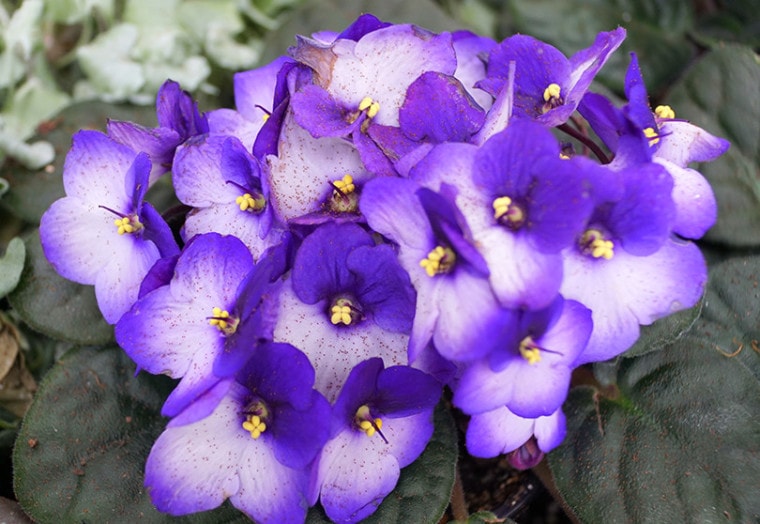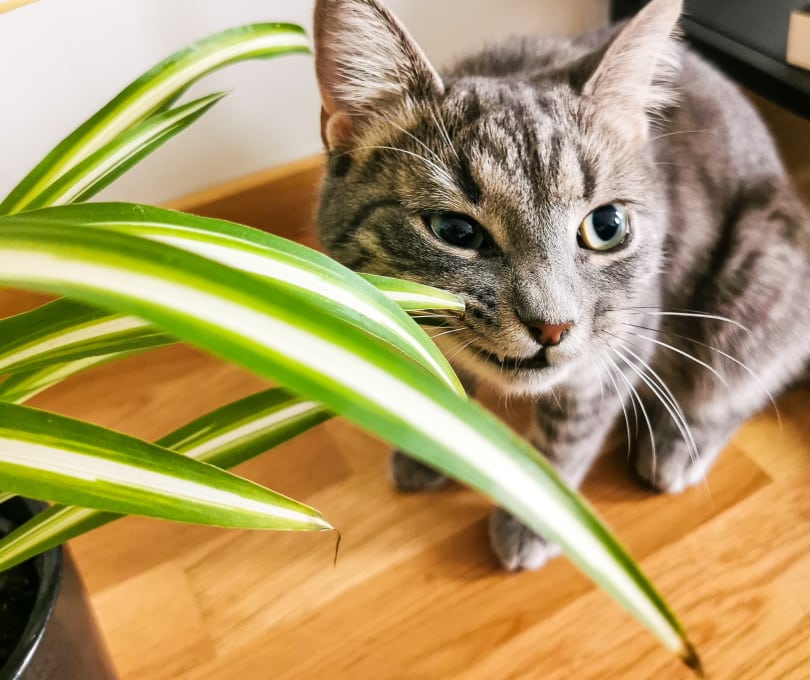
The African violet (also known as Cape marigold) is a year-round flower and a common houseplant. Not many cat owners will think about the safety of the plant species for their cat when they first purchase the plant, which can be dangerous if the plant is potentially poisonous to your pet. Fortunately, this flowering plant is non-toxic and safe for cats.
This means that most parts of the African violet are not toxic or harmful to cats if consumed in small quantities. However, there are certain factors to consider before completely ruling out your African violet as safe for cats, which we explain in this article.
Can Cats Eat African Violets?
Cats are curious creatures that are constantly exploring their environment and testing new things. Their curiosity may have driven them to take a bite out of your African violet (Saintpaulia spp.), but before you panic, according to the ASPCA website, African violets are not poisonous to cats and can safely be grown in the same environment as cats. This includes the wild version, which generally grows in gardens.
However, no pesticides, herbicides, or other growth-enhancing chemicals should be used during the growth stages of the African violet. These chemicals can be hazardous to cats but might be used to speed up the violet’s growth phase. It is reassuring that the plant itself is safe, but when potential toxins from common gardening chemicals can put your cat’s health at risk.
Why Is My Cat Eating My African Violet?
Some cats are more inquisitive than others and may chew on items, including plants, around the house. Kittens also tend to be more curious and adventurous. Cats suffering from pica (the urge to eat non-edible items) may begin to chew or eat items around the house. This can include houseplants, plastic, electrical cords, and other unusual items. Pica is seen more typically in certain cat breeds, but the exact cause is not clear.
If you have recently acquired an African violet, curiosity may have driven your cat to nibble on the plant. A problem can occur when your cat repeatedly eats your African violet and other items; then pica could be a possibility. If you notice your cat nibbling or chewing on items around the house, it is best to speak to your vet as soon as possible, since it might be a sign of disease or a behavioral issue.
African Violet Fertilizers and Herbicides
Fertilizers and herbicides are commonly used to aid in a household or garden African violet’s growth and blooming. They are toxic to cats and can cause serious gastrointestinal problems unless treatment from a veterinarian is prompt. Understanding the danger of certain chemicals is just as important as identifying the plant species to determine if it is safe for your cat.
Most household plants will come from a store such as a grocer or a plant nursery. Rarely, these places do not use certain chemicals on their plants. After all, these chemicals are great for the plant but bad for your cat. Herbicides and fertilizers can be placed in soil or added directly to the plant. Unfortunately, some of these chemicals can be stored in the plant for a long time.
Before purchasing an African violet, ask the store about the plant’s history and if any chemicals have been used on the plant.

Which Parts of African Violets Are Safe for Cats?
All parts of the African violet are safe for cats if they were to be ingested. This includes the leaves, flowers, roots, and stems of the plant. However, you should still ensure that your cat does not try to eat African violets even if they are not poisonous to cats.
The African violet has thick, hairy leaves that might be irritating to your cat’s soft tissue, including their lips and mouth.
Your cat can suffer from diarrhea, bloating, and vomiting if they do eat a large amount of the African violet because their body is unable to properly digest large amounts of plants.
How to Stop Cats From Eating African Violets
If you have a reoccurring problem with your cat eating your houseplants, it is best to investigate their diet to determine if a certain nutrient is missing from their staple food. A cat that has a balanced and complete diet to suit their carnivorous dietary requirements, will rarely continue to seek different food sources, especially from plants that do not taste good to them.
Using effective and safe measures to protect both your cats and houseplants is important. You want to use methods that can be used in the long term.
Indoor Plants
If your preferred houseplants are not poisonous to cats and you want to try keeping them at home, ensure that they are placed somewhere your cat can’t access. After a while, once they have forgotten about the plant, you can try to put it back in its original place—your cat may simply ignore your African violet at that point!
Avoid using any type of essential oils on or around plants to deter your cat, even if they are marketed to be pet safe. Cats are extremely sensitive to essential oils and can suffer from poisoning.
Outdoor Plants
Keeping cats out of your garden can seem like a difficult task, but it is possible and not that difficult! For example, you can use ground textures that they dislike, motion-activated sprinklers, or loud and sudden noises.

Keeping Houseplant with Cats
Many cat owners may be discouraged from keeping plants when they own cats, however, this does not have to be the case if you take precautions.
Final Thoughts
African violets are not poisonous to cats, and if you witness your cat nibbling at your African violet, they should be fine, but you should still monitor them and contact your vet if you notice anything unusual. Always monitor your cat’s behavior after they eat parts of the plant, and ensure that safety measures are in place to deter your cat from doing this again.
Featured Image Credit: African Violet_Khairil Azhar Junos, Shutterstock








